Call center sales training: How to get the very best out of your team

Director of Sales Development at Dialpad

Tags
Share
Every company with an outbound sales team understands how important call center sales training is, not just for driving sales, but also for ensuring customer satisfaction down the line.
Well-trained sales reps can engage more customers effectively, handle objections better, and book more meetings and close more sales. But how do you do it?
In this blog post, we’ll go through the importance of call center sales training, methods to improve training, best practices, and features to look for in call center training software.
Ai sales coaching to reinforce sales training
Give your sales team real-time Ai coaching for consistency among your sales team.
What is call center training?
Call center training encompasses a structured program that’s designed to equip call center agents and reps with the skills and knowledge they need to effectively engage customers. This training typically includes a mix of theoretical knowledge and practical skills, tailored to meet the specific needs of your company’s call center environment.
Depending on the type of call center you run, your agents might be tasked to promote products or services, provide customer support, book meetings, and/or close sales.
Why is training important in a sales call center?
Training is critical in a sales call center for several reasons:
1. It maximizes rep performance
Even the most talented and seasoned sales reps need to continuously refine their skills to adapt to changing market dynamics and prospect expectations. New competitors pop up regularly, new objections come up, pricing plans change—all of these constantly evolving elements mean that reps have to be kept up to date regularly.
What made a rep successful for the last five years might no longer be effective for the next five years, and a structured training program and sales methodology will provide sales reps with the latest techniques and strategies to hit their number consistently.
2. It helps reps continuously improve product and market knowledge
For any high-performing sales team, comprehensive product knowledge is crucial. Good call center sales training makes sure that reps are not only familiar with the features and benefits of the products or services they’re selling, but also comfortable talking about the broader market context with prospects.
The business landscape is always changing (just look at what AI did in the span of just a few short months), and this deep understanding allows them to position offerings more effectively against competitors and to tailor their pitches to specific customer needs.
Whether it's a shift in consumer behavior or an economic downturn, well-trained reps can adapt their sales strategies to maintain performance and capitalize on new opportunities.
3. It ensures consistency
In a sales call center, especially if you’re managing remote teams, maintaining consistency in messaging can be challenging. You’ve got new reps coming in all the time, turnover in sales is notoriously high, and successful salespeople can come from a huge variety of backgrounds and experiences.
Because of this, consistency is especially hard to achieve. That’s why training programs are so important—they ensure that all reps, regardless of how they got to your team, are on the same page about brand messaging, your sales methodology, and so on.
As part of our program, we use Dialpad’s Ai Playbooks to help reps easily see what they have to ask a prospect on a call—Dialpad Ai helpfully highlights questions that reps have to run through and automatically checks them off in real time:
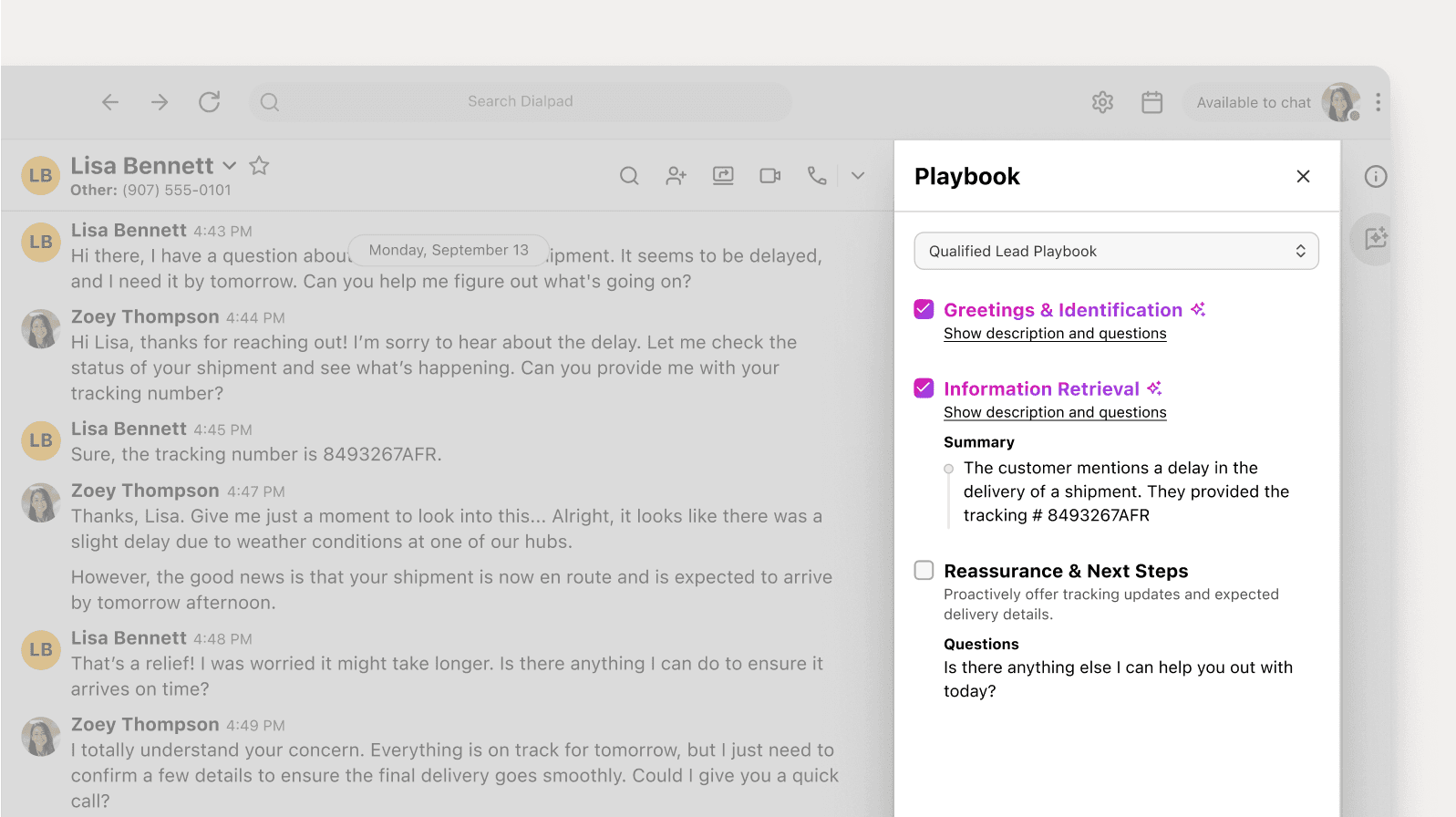
4. It leads to a better prospect and customer experience
What sometimes gets overlooked in favor of metrics and ROI is the prospect experience. It’s harder to quantify, sure, but a well trained sales team doesn’t just close at a higher rate—they win deals in a way that sets up your customer for success (and makes life easier for your support and customer success teams later on).
A poorly trained sales call center team that tries to close at any cost or sells customers on features that don’t even exist yet may have a high conversion rate, but many of those new customers will quickly churn once they realize that your product isn’t a good fit, or that they were promised something that isn’t real. This is the type of thing that you want to minimize or eliminate with training. Taking a holistic approach to the sales process is essential for long-term success.
5. It raises rep confidence
Continuous professional development is a key driver of employee satisfaction, and reps who receive regular training tend to feel more valued and see clear pathways for career advancement. This not only boosts morale, but also reduces turnover rates, which can be particularly high in both call center and sales environments. (Combine call center attrition rates and sales attrition rates, and managers have got a particularly tricky challenge on their hands.) A well-trained, motivated team is more likely to not just perform at a higher level, but also stay committed for a longer period of time.
What topics are covered in call center sales training?
Call center sales training typically covers a range of topics, including:
Product knowledge: Detailed information about the products or services being sold.
Sales techniques: Effective strategies for engaging customers and closing sales. This usually falls under the umbrella of your sales methodology, like SPICED or MEDDIC.
Objection handling: Techniques for overcoming customer objections and concerns.
Customer Relationship Management (CRM): How to use your CRM system to track and manage customer interactions.
How long does call center sales training usually last?
The duration of call center sales training varies depending on the complexity of the products or services reps are selling and the training methods used. Typically, training can last anywhere from a few days to several weeks. Ongoing training and refreshers are also good to keep agents updated on new products, techniques, and industry standards.
If you need to get your reps to hit the ground running quickly, a sales AI tool can be very helpful. Dialpad, for example, can instantly detect when certain keywords are spoken on a call and find answers for the rep via the Ai Live Coach feature—essentially acting as an Ai sales coach for reps who are thrown into the deep end in their first or second week:
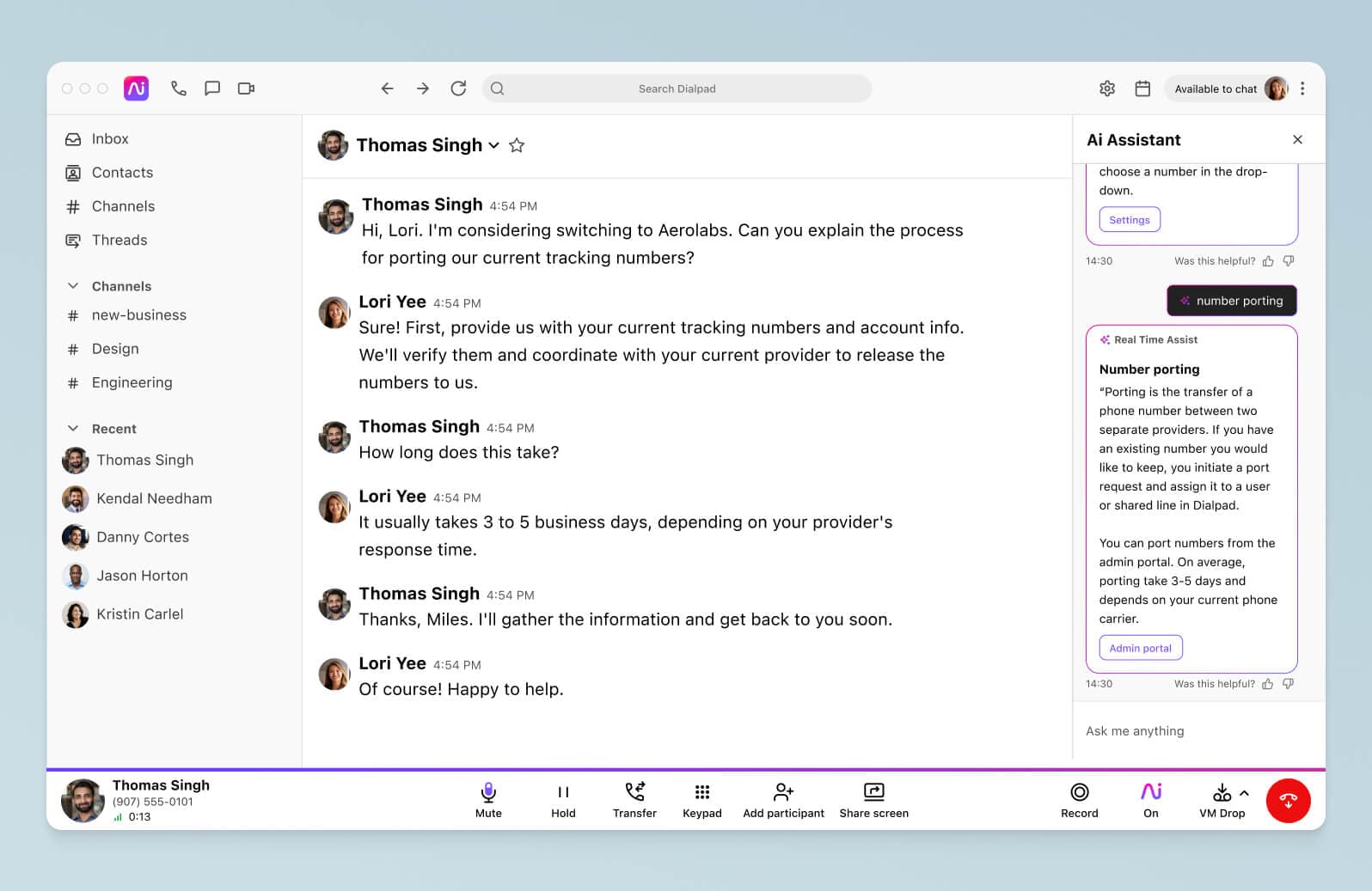
How to improve call center sales training: Methods and techniques
If you’re looking to level up your team, consider these call center sales training techniques and methods:
1. Interactive training
Use realistic role-playing scenarios to help reps get some practice talking through sales calls. This hands-on approach allows reps to practice and refine their techniques in a controlled environment, helping them develop the confidence and skills needed to handle real discovery calls and demos.
With Dialpad’s call recording and playlist feature, managers can put together recordings of great sales call examples and send them to reps to review on their own time—or use them as role-play scenarios for training sessions:
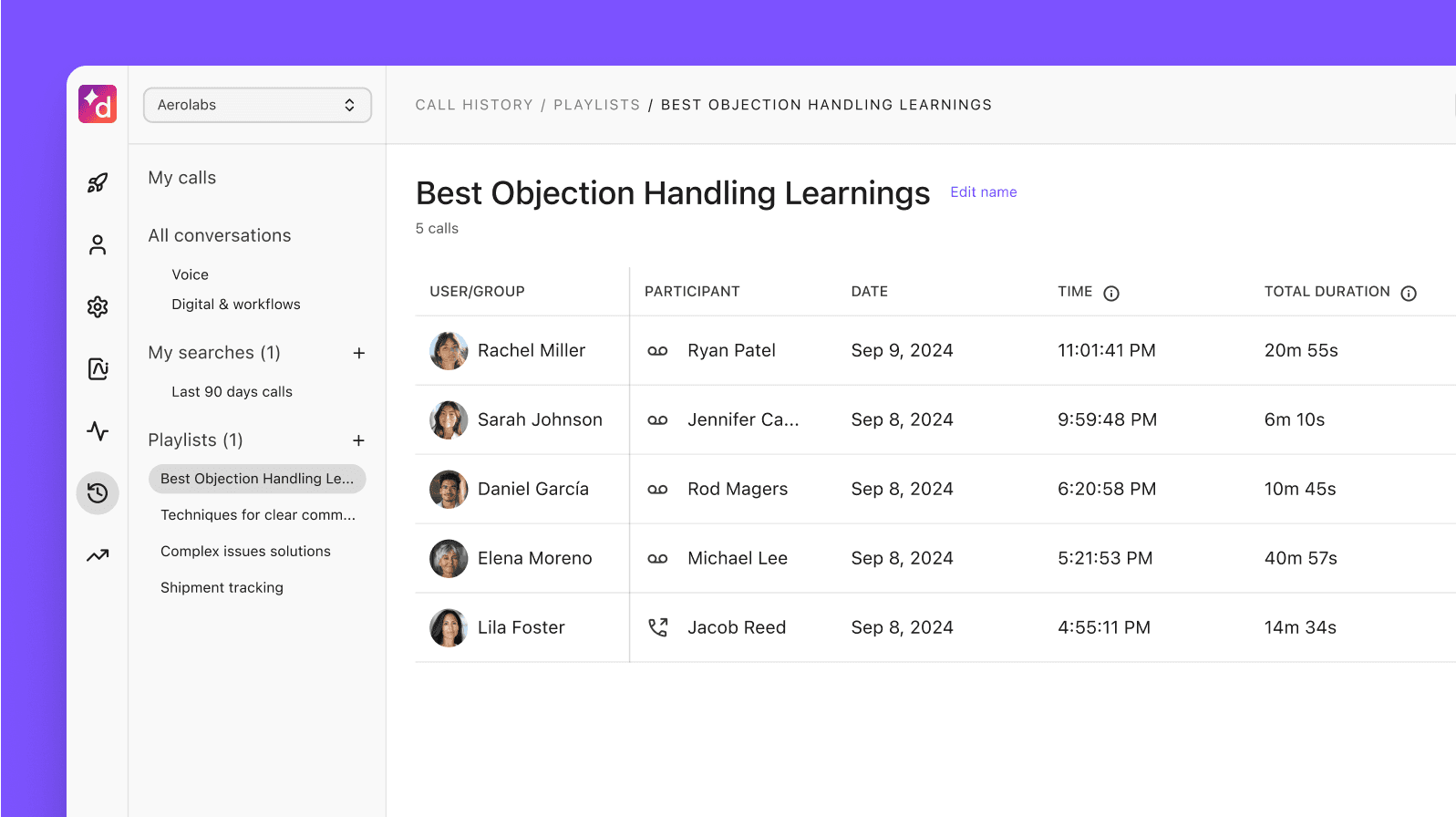
2. Personalized coaching (via AI)
Managers can also provide one-on-one coaching to address individual reps’ strengths and weaknesses. We use Dialpad's Ai Scorecards to help us speed up the review process—Dialpad Ai analyzes sales calls and can check whether our reps did everything listed in our QA scorecard criteria.
Say you've added “Rep asked the prospect what the buying timeline is" to the scorecard criteria. If the rep asks about timelines, whoever grades that call will instantly see that the task was done, thanks to Dialpad Ai:
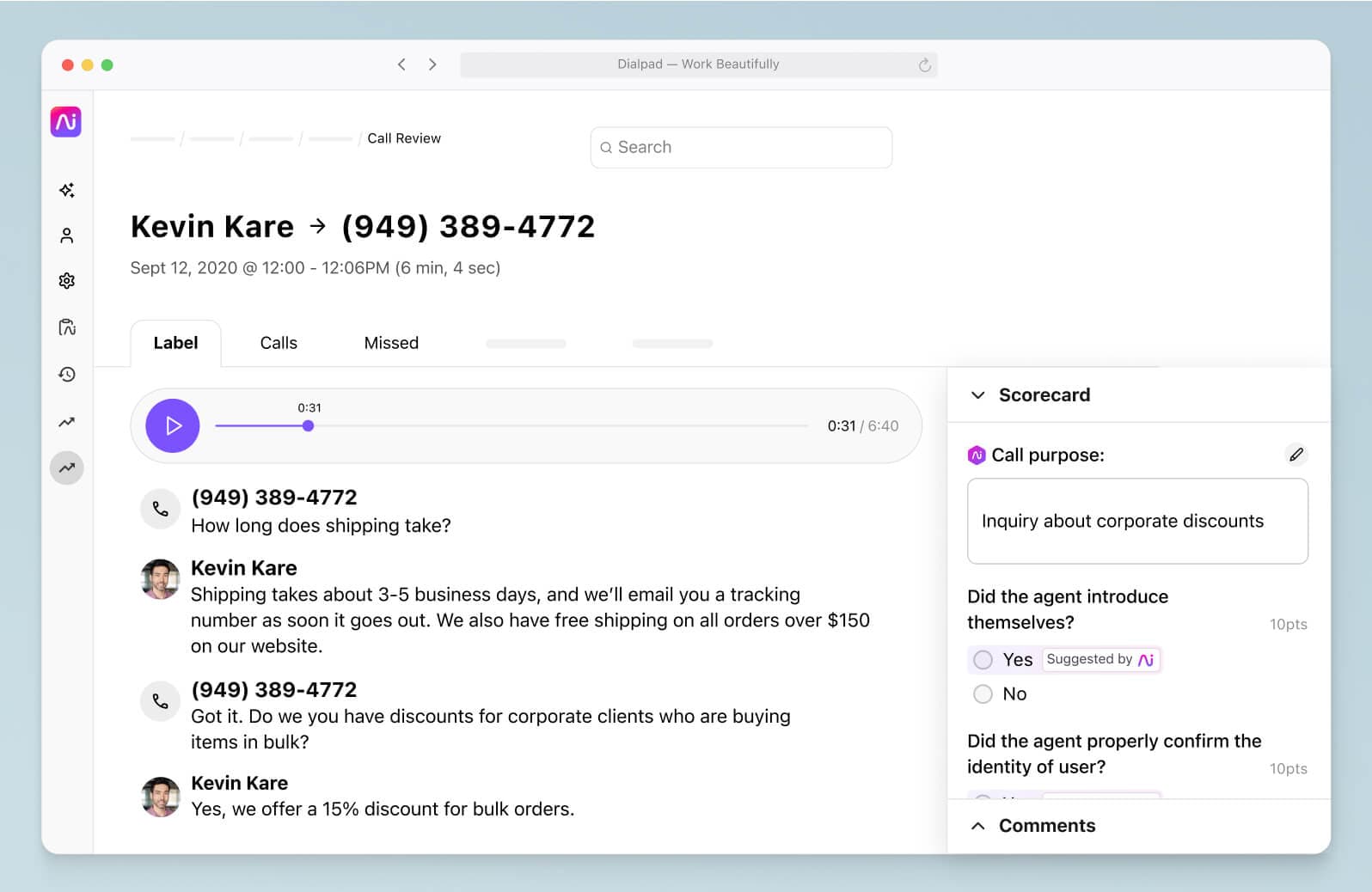
3. Real-time feedback
It’s important to be able to give sellers real-time feedback too. Again, AI is great here because it can remove the burden from managers who have to oversee large teams.
Dialpad Ai also analyzes positive and negative call sentiment in real time, which means that if a prospect says things like “I’m frustrated,” Dialpad can pick up on that and mark the call sentiment as negative. (And vice versa if the prospect is saying positive things like “I love that feature!”)
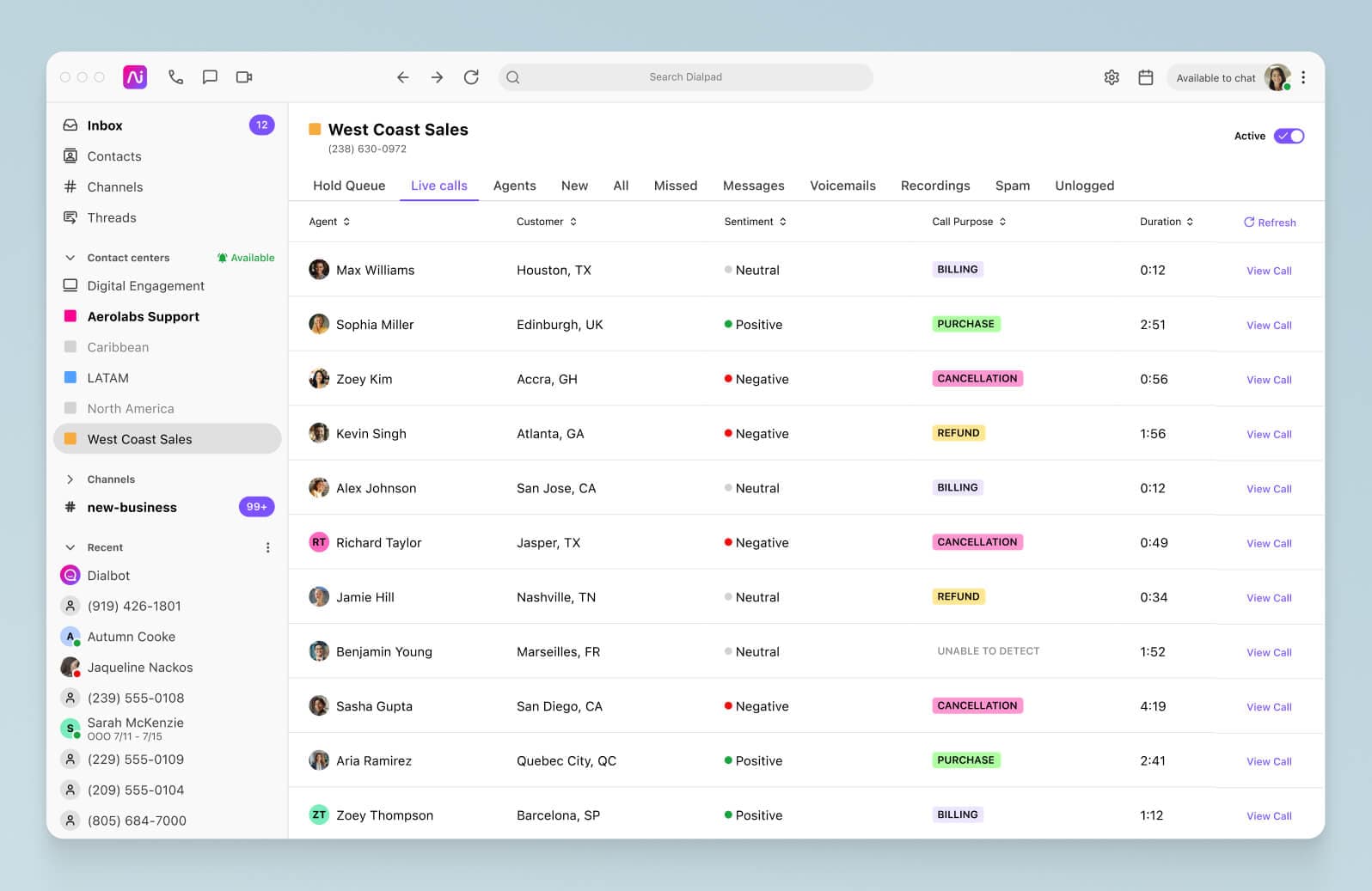
If a sales call center manager does see a call with negative sentiment, they can open the real-time transcript, read it quickly to get more context, and decide if they need to jump in to help the rep. It’s a lot more effective than the alternative (having to listen in on every call).
4. Metrics and analytics
Use qualitative and quantitative data to track individual and team performance metrics, and identify areas where reps excel and where they need improvement. This data-driven approach keeps things objective (the Ai Scorecards feature I mentioned earlier are great for this) and ensures that training is tailored to address each rep’s specific weaknesses.
5 call center training best practices
Now, let’s look at a few call center training tips:
1. Set clear objectives
Ensure that your training objectives are closely aligned with your overall business strategy and goals. This alignment makes sure that the skills and knowledge that reps are learning will directly contribute to achieving key business outcomes, whether that’s revenue growth or account expansion.
Establish specific, measurable Key Performance Indicators (KPIs) for your training programs, which might include conversion rates, customer satisfaction scores, and meetings booked. Use these metrics as a benchmark for assessing the effectiveness of your sales call training initiatives.
2. Use AI to help both reps and coaches
There are so many use cases for AI already in sales call centers that it should be a best practice to at least explore how you can incorporate AI-powered training tools to better support your reps and call center managers. From analyzing individual performance data to identifying ways to improve your sales strategy, there’s probably a way to use AI to speed up or improve almost every step of the sales process.
3. Establish feedback loops
Establish robust feedback loops where sellers can receive real-time feedback on their performance. Use call recordings, customer feedback, and peer reviews to provide actionable insights that they can use to refine their skills.
4. Leverage data and analytics
Implement analytics tools to keep an eye on rep and team performance before, during, and after the call. Data is one thing that sales teams are not lacking right now—there’s no excuse to not be data-informed as a sales team.
The difficult part is organizing and filtering the data to pinpoint what you need, but AI can help with this. (Like how we use Dialpad Ai to help with QA scoring and reviewing calls to make sure sellers are following our sales methodology.)
5. Evaluate and adjust
Call center sales training is a process. It’s not a one-off project, and a succeeding training program should be recalibrated regularly to make sure you’re keeping up with product updates, market changes, and your competitors. Continuously evaluate the effectiveness of your training program and make necessary adjustments.
What is call center sales training software?
Call center sales training software is a program that’s designed to help with training call center agents and reps. There are many different types of call center training software—some are more focused on features like call center workforce management, while others are designed to help with live on-the-call training.
What features to look for when choosing software for call center sales training
When selecting call center training solutions, you have to first know what your team needs. Do you need something like Highspot to just store all of your training materials and documents? Or are you looking for an AI-powered platform that helps with live call center coaching and real-time assists for reps?
Once you know what you need, you can start looking at features. Here are a few to consider:
A user-friendly interface: Is the software easy to navigate for both your trainers and reps?
Built-in AI: Does it come with AI features, and are those features built in-house? If not, they’re probably integrated with a third-party AI solution, which will lead to questions about compliance and which vendor will provide customer support if you run into issues.
Scalability: Try to choose software that can scale with your business as your training needs grow. If you need to add 100 users because your sales team is expanding fast, for example, can you add that number of users in the training software easily?
Integration: Ensure the software can integrate with your existing CRM and other tools.
Dialpad Sell powers effective call center sales training
Effective call center sales training is crucial for sustained success, for any outbound sales team.
If you need to improve rep performance and drive sales growth for your sales call center team, take a product tour of Dialpad Sell to check out the many sales call training features!
See how Dialpad Sell can help teams with sales training!
Book a demo of Dialpad Sell and see how it can help your sales org accelerate activity and win more deals. Or, take a self-guided interactive tour of the app on your own!
